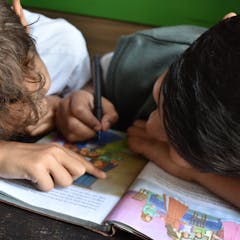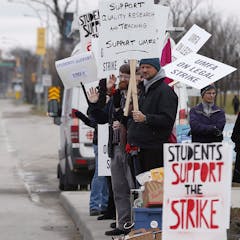
Articles on Ontario education
Displaying 1 - 20 of 39 articles

The government must call together a task force of educators, families and researchers to work toward better solutions for inclusive education as education for all.

Decisions to fill teacher vacancies with uncertified adults compromises children’s education and reveals a demeaning notion that teachers — in a female-dominated profession — are merely babysitters.

Ontario’s Strengthening Accountability and Student Supports Act threatens to undermine university autonomy, and could serve to censor critical thinking and dissent on campuses.

Developmentally progressive instruction allows children to learn handwriting. An open-educational resource by literacy and writing experts supports instruction for kindergarten to Grade 3 children.

We need to ensure the best scientific research in play-based learning and early reading is leveraged, and teachers receive supports to meet children’s developmental and academic needs.

Parents in a study about the accessibility of French immersion programs discussed inadequate support for learning to read and feeling pressured to pay for expensive tutors.

To boost post-pandemic math learning, a multi-dimensional approach is needed that promotes the success of the whole child: academic, physical and socio-emotional.

Insights from youth about COVID-19 school closures and youth exclusion from pandemic-related decisions suggest we have an opportunity to improve how we support youths’ rights.

Researchers from an Indigenous literatures lab examine texts that are well-suited for a new Grade 11 course, First Voices.

Trading the right to strike for binding interest arbitration is a minefield for unions.

A contributing factor to a rise in violence in Ontario schools is underfunding of education and the social service sector. Using trauma-informed responses is part of the solution.

Education strikes by university and public school workers are political fights about diminished respect for education as a public good and workers’ rights in an economy that perpetuates inequality.

Frustration about unsettled bargaining that predates the pandemic could get channelled into pronounced resistance from educational workers during the coming months.

The Ontario government’s latest use of the notwithstanding clause is at odds with its stated intention to keep kids in school amid a labour dispute — and at odds with the heart of labour relations norms.

Teaching computer programming to youth can prepare them for the future job market, promote equity in tech professions and develop students’ computational thinking skills.

Direct instruction matters in learning to read, but reading can’t happen unless children are supported in making connections to what they know and their experiences.

Ontario’s incoming government after the election will have its work cut out for it in restoring the public’s faith after extensive school closures.

Rethinking accountability structures, how to engage parents and the community and how to support anti-racist leadership competencies all matter.

Virtual education piggybacked onto classroom learning demonstrates a lack of respect for teachers, student equity and public education.

A policy of “choice” for full-time online schooling would weaken public education, erode funding for in-classroom supports and drive those who can afford it to private education.
